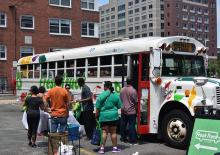Found 5 resources.
0
0
0

When the school day ends, far too many children return home to empty refrigerators and bare cupboards. The federal Afterschool Nutrition Programs provide healthy meals and snacks to children to ensure they are fed after school (and on weekends and during school holidays). According to FRAC’s latest Afterschool Suppers: A Snapshot of Participation report, the District of Columbia had the highest participation in the nation of children in the Afterschool Supper Program, with a 31.6 percent increase in participation between October 2016 and October 2017.
Topics: Child welfare, East Coast, Education, Food insecurity, Health, Low-income, Nutrition, Out-of-school time
 Shared by Housing Is
on Jan 16, 2019
Shared by Housing Is
on Jan 16, 2019 0
0
0
Massachusetts Attorney General Maura Healey on Tuesday announced $3 million in grants to 13 community organizations that address things like housing, hunger and other societal factors that affect someone’s health.
Topics: East Coast, Food insecurity, Health, Housing, Low-income, Nutrition, Partnerships, Preventative care
 Shared by Housing Is
on Jan 16, 2019
Shared by Housing Is
on Jan 16, 2019 0
0
0
This study draws on qualitative interview data to examine transitions into rent-assisted housing as they relate to diabetes self-management behaviors.
Topics: East Coast, Health, Homelessness, Housing, Low-income, Mental health, Metrics, Nutrition, Research, Stability
 Shared by Housing Is
on Aug 1, 2018
Shared by Housing Is
on Aug 1, 2018 0
0
0

Health promotion interventions in public housing communities have the potential to reduce obesity among residents, a new study shows. Changes in their environment, such as fresh food trucks, walking groups, screenings, and cooking demos, helped Boston residents eat better and get more exercise.
Topics: East Coast, Exercise, Food insecurity, Health, Housing, Low-income, Nutrition, Obesity, Research
 Shared by Housing Is
on Jul 27, 2018
Shared by Housing Is
on Jul 27, 2018 0
0
0
In Boston, Massachusetts, the Boston Housing Authority, Boston Public Health Commission, the city’s Inspectional Services Department, the Boston Foundation, and local universities and medical institutions have come together over the last decade-plus to address the intersection of health and housing. Motivated by a desire to improve the lives of Boston’s most vulnerable residents, these organizations began collaborating to address asthma and, more recently, to prioritize housing and health needs for pregnant women. By bridging anchor institutions, foundations, and city agencies around health...
Topics: Asthma, Child welfare, Dual-generation, Early childhood, East Coast, Exercise, Family engagement, Funding, Health, Home visiting, Homelessness, Housing, Low-income, Medicaid / Medicare, Nutrition, Obesity, Partnerships, Pre-natal, Preventative care, Research, Smoke-free
 Shared by Housing Is
on Jul 12, 2018
Shared by Housing Is
on Jul 12, 2018 

